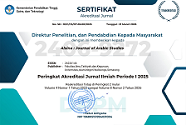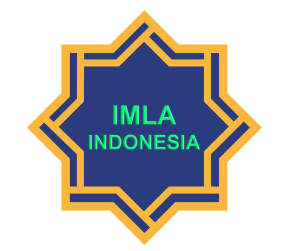Pengembangan Kegiatan Ekstrakurikuler Bahasa Arab di Pondok Pesantren
DOI:
https://doi.org/10.21580/alsina.2.2.4802Keywords:
Kegiatan ekstrakutikuler, Bahasa Arab, Lembaga Pengembangan Bahasa AsingAbstract
This study discusses the development of extracurricular activities in Arabic at Nurul Jadid Islamic Boarding School, Paiton-Probolinggo, which includes: 1) Types of activities, 2) Planning activities, 3) Implementation of activities, and 4) Evaluating activities. This study uses a qualitative descriptive method with a case study approach. The qualitative data in this study included extracurricular activities in Arabic. The data sources of this research are the core management and students in the LPBA. The instrument is the researcher himself (human instrument). Data collection was obtained through the results of distributing questionnaires, interviews, observation, and documentation. The results showed a number of things, namely (1) twelve extracurricular activities attended by students at ula and wushta levels with the hope that students often get used to listening to hiwar or Arabic conversations from native Arabs, and can apply them in daily conversations. day (2) Planning activities consist of student organizations, curriculum, schedule arrangements, activity themes, and regulations, (3) This activity is carried out every night after teaching and learning activities (KBM) and Friday from morning to evening, and (4) Evaluation of this activity is carried out once a month with the aim of finding solutions to problems experienced by students.
Downloads
References
Ainin, Moh. 2016. Metodologi Penelitian Bahasa Arab. Malang: CV. Bintang Sejahtera
Arsyad, Azhar. 2003. Bahasa Arab dan Metode Pengajarannya. Surabaya: Pustaka Pelajar
Hamalik, Oemar. 2002. Psikologi Belajar Mengajar. Bandung: Sinar Baru Algensido
Hamalik, Oemar. 2003. Proses Belajar Mengajar. Jakarta: PT. Bumi Aksara
Rosyidah, Afisah. 2015. Pembelajaran Bahasa Arab Dengan Metode Mind Map Untuk Meningkatkan Hasil Belajar Siswa Kelas V Madrasah Ibtidaiyah (Studi Multi Situs Di Min Kanigoro Kras Kediri Dan Mi Tarbiyatul Islam Jemekan Ringinrejo. Thesis.
http://repo.iain-tulungagung.ac.id/id/eprint/3217. Diakses pada: 9 Juli 2019
Sudjana, Nana. 2003. Penilaian Hasil Proses Belajar Mengajar. Cetakan ketujuh. Bandung: PT Remaja Rosdakarya
Uno, Hamzah B. 2011. Perencanaan Pembelajaran. Jakarta: Bumi Aksara
Wiyono, Bambang Budi. 2003. Hubungan antara lingkungan belajar. Jakarta: Forum penelitian
Downloads
Additional Files
Published
How to Cite
Issue
Section
License
Copyright
The copyright of the received article shall be assigned to the publisher of the journal. The intended copyright includes the right to publish the article in various forms (including reprints). The journal maintains the publishing rights to published articles. Authors are allowed to use their articles for any legal purposes deemed necessary without written permission from the journal, but with an acknowledgment to this journal of initial publication.
Licensing
In order for Alsina: Journal of Arabic Studies to publish and distribute research articles, the editors need publishing rights (transferred from author to publisher). This agreement relates to the transfer/publishing copyright license to Alsina: Journal of Arabic Studies but the authors still have significant rights to use and share their published articles.
Alsina: Journal of Arabic Studies supports the need for writers to share, disseminate and maximize the impact of their research and their rights on any database. As a journal article writer, you have the right to various uses of your articles, including that by the institution or company where you work. Copyright can be used without the need for special permission. Authors who publish articles in the Alsina: Journal of Arabic Studies have broad rights to use their work for teaching and scientific purposes without requesting permission, including:
- Use by the author for lectures, presentations, or conferences, with distribution of copies to participants;
- Distribution to colleagues for research use;
- Use in compilations of the author's subsequent work;
- inclusion in a thesis or dissertation;
- Reuse of sections or excerpts from articles in other works (with full acknowledgment of the final article);
- Preparation of derivative works (other than commercial purposes) (with full acknowledgment of the final article);
- Voluntary posting on open websites operated by authors’ or writers' agencies for scientific purposes
When submitting a manuscript, authors do so on the understanding that if accepted for publication, the copyright for publishing (publishing right) of the article shall be assigned/transferred to Alsina: Journal of Arabic Studies.
Authors whose articles are accepted for publication will receive confirmation via email and sent a Copyright Transfer Agreement.


 Accreditation
Accreditation 
 In Collaboration with
In Collaboration with 

 Visitors
Visitors  Article Template
Article Template





